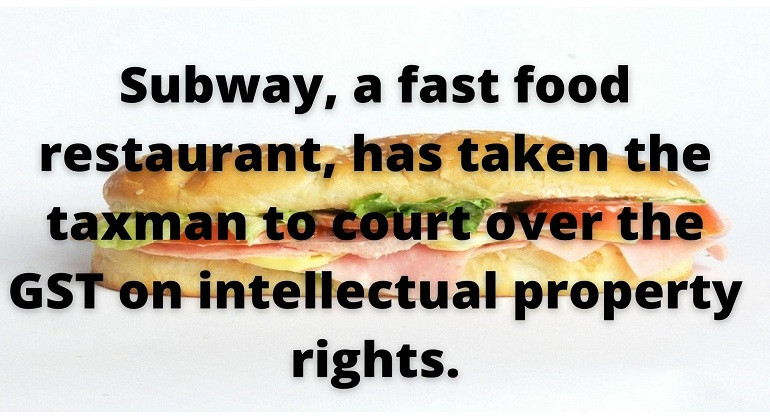

Subway, a fast food restaurant, has taken the taxman to court over the GST on intellectual property rights.
Subway, a fast food restaurant, has taken the taxman
to court over the GST on intellectual property rights.
Subway, an American fast food restaurant, has taken
the indirect tax department to court, alleging that it was forced to pay
differential GST on services before sending any notices. Subway Systems India
claimed in a writ case filed in the High Court of Punjab and Haryana that the
tax department had issued several summonses to high management over the
taxability of intellectual property rights. The company also claimed that the
tax department continued to issue summonses without following the proper
procedure, thereby causing "traumatization" to anyone. Despite
stating to the tax authorities that an advance ruling application is pending, the
summons were issued, according to the Milford-based fast food company.
Hearing Subway's petition, the High Court ruled that
Subway should be given adequate time to state its case. Subway has been ordered
to present all relevant information, after which the authorities will issue a
spoken order to decide the matter. According to legal experts, this means that
tax authorities will be unable to reclaim any funds until the case is resolved.
The conflict stems from a disagreement about whether intellectual property rights
and royalties are taxable. Multinationals that operate in India through
franchisee models, such as fast food chains, hotels, and software enterprises,
have come under scrutiny, as ET first reported on August 29. The tax agency is
disputing the structure of the agreement and seeks to apply an 18 percent GST
on multinationals' profits or royalties.
The average multinational pays roughly 12% GST. On
the amount, they argue they are not transferring the brand name or granting the
Indian business perpetual use of the brand name. According to multinationals,
there is a distinction between "right to use" and "transfer of
right to use" of a brand name, thus GST rates on royalty income should
change as well. The tax authority claims that this is just tax arbitrage
jargon. Multinationals use the franchisee model to allow Indian enterprises to
operate specific stores, hotels, or entities under their worldwide brand name.
A percentage of profit, royalties, or other income is charged by the franchisor
or multinational in exchange for this.
Abhishek A Rastogi, Partner at Khaitan & Co,
argued on behalf of the petitioner that no inquiry can be launched if there is
no evidence of tax evasion, and that no demand can be recovered without issuing
a show cause notice. "Numerous summonses have recently been sent to top
management, and they have been obliged to pay a large quantity of money even
before a show cause notice or an order has been issued. While an application
for an Advance Ruling is pending, the tax authorities may issue multiple
summonses with no time limit to produce data/information and attempt to recover
revenue without issuing a show cause notice."
Several global corporations operate in India using
various franchise arrangements. Most global fast-food chains—burgers, pizza,
coffee, sandwiches—allow exclusivity depending on micro-geography. In
Churchgate, Mumbai, for example, a burger joint can allow one franchisee,
However, this does not rule out the possibility of another in Nariman Point in
the same city. In most situations, the contract specifies a term of 99 years or
less. In essence, the tax department maintains, this is just nomenclature. The
way contracts are worded tends to determine the tax rate under the tax
structure.The Internal Revenue Service wants to look into the "content
over form" of these contracts. That is, whether the contracts are just
drawn in a certain way to save money on taxes.



